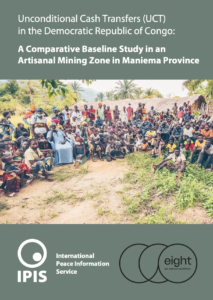A controlled impact study will be conducted by IPIS to evaluate the net effects of Unconditional Cash Transfers (UCT) on the socio-economic well-being of recipients. A controlled study approach allows potential effects of the intervention to be assessed by monitoring specific indicators in the group of people receiving cash transfers (inhabitants of the UCT village), in comparison with a comparable group of people not receiving UCT (inhabitants of the control village).
A baseline survey has been conducted in the UCT village and the control village to measure a broad range of indicators, two weeks before the start of the intervention. To monitor the UCT impact on people’s well-being, IPIS developed a questionnaire including indicators of well-being as defined by the Organization for Economic Co-operation and Development (OECD) covering quality of life, material living conditions, and sustainability over time.
In order to measure change over time, IPIS will conduct follow-up surveys after one and two years, in the UCT and control villages.
This study had been conducted in the framework of a project implemented by Eight world vzw and financed by Eight, the Belgian Ministry of Development Cooperation (DGD) and Fairphone.





